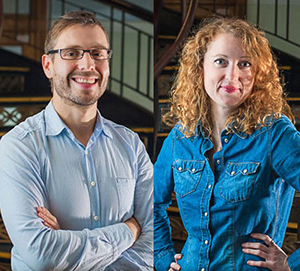
Often derided as "clicktivism," online organizing is finding its footing in Canada's democratic process, and producing results.
While there may be some handwringing in activist circles about online action subverting or replacing in-person, street level work, there's no doubt any longer that well-considered, targeted online campaigns can shift public policy in major ways.
Take, for example, OpenMedia's work to engage Canadians in telecommunications policy. In the seven years it has been in operation, the digital rights organization has grown its online community to over 750,000 people who are willing to collaborate on policy solutions and push back against communications decisions being made by Canada's government. This community has worked together to stop an online spying bill, fight against usage-based billing by Internet service providers, and more.
When that many people act together, policy-makers have no choice but to sit up and listen. Now, OpenMedia founder and executive director Steve Anderson and community engagement specialist Reilly Yeo will share their strategies for building an active online community in a special Tyee Master Class webinar.
In two sessions that you can join anywhere that you have Internet access and a computer, Anderson and Yeo will go over their hard-won lessons in engaging people in meaningful action to create change. Register now.
We asked Reilly Yeo about the growing practice of online crowdsourcing, and what to expect in the master class.
The Tyee: What is crowdsourcing?
Reilly Yeo: Crowdsourcing is harnessing the wisdom of a distributed group of people to produce a solution that is better (i.e. more robust, more representative, more likely to have a positive impact on people's daily lives) than a small group or single individual would produce on their own.
Who uses it? What can it be used for?
Many different kinds of organizations use it -- advocacy groups, charities, governments, businesses. Some famous examples are Wikipedia, a crowdsourced encyclopedia that has several distinct advantages over traditional closed-source encyclopaedias, convened by the Wikimedia Foundation. Media outlets have also used it to take on big investigative projects with data, like the Guardian newspaper crowdsourcing a review of MPs expenses, or the New York Times crowdsourcing a review of Sarah Palin's publicly released emails.
At OpenMedia, we use it to come up with visions that can guide work on the pressing policy challenges that define the digital age -- like how to create new privacy laws, or reinvent our public media, or protect free expression. We tap the wisdom of our community of hundreds of thousands, and we use their guidance to create a solution that is not only better than what policy-makers (who tend to be more beholden to outdated industry bureaucracies) are pursuing, but also has a much greater emphasis on public buy-in and understanding. Having participated in creating the solution makes our community more excited to advocate for it.
How new is this? How does crowdsourcing differ from older forms of organizing?
This type of incredibly large-scale distributed crowdsourcing is as new as the Internet -- newer even, since it has only really emerged in the last decade or so. But it comes out of a tradition of voluntary, large-scale collaboration to gather knowledge on scales that aren't possible for one individual alone. Even more than a hundred years ago, biologists and astronomers and other scientists looked to the public to participate in things like bird counts, or monitoring falling stars, or submitting genealogical information. Those were early forms of crowdsourcing.
It differs from older forms of organizing mainly in terms of the scale, the speed, and the geographic distribution of the communication that it makes possible. Crowdsourcing opens up the possibility for a whole new form of participatory democracy, where we could be bringing people together around the world in thoughtful, informative processes that would allow the public to meaningfully shape policy, rather than simply voting for a representative every few years.
How do you think crowdsourcing will affect the upcoming federal election?
Crowdsourcing provides a new and very important way to assess the legitimacy of governments, and to build alternative, more representative, more inclusive policy platforms. Crowdsourcing will have an impact because distributed campaigns have shown the public's dissatisfaction with things like Bill C-51 -- they provide a window into public sentiment beyond opinion polls, and help rally more people who may otherwise only silently dissent.
More than any other election in Canadian history, though, people may be looking too much at this election as an endgame -- when really it will only be the beginning of the next opportunity to set an agenda for the future of the country. More groups should be looking at engaging their supporters in putting together the kind of crowdsourced plans that OpenMedia or Leadnow have produced -- plans that take into account a wide range of different perspectives; have some broad public buy-in, enthusiasm and momentum; and can be used in the post-election reality to hold governments to account and push them for well-defined, forward-thinking action that's truly in the public interest.
What is the most important thing for people to know as they plan a crowdsourcing campaign?
Crowdsourced visions are only as good as the crowd that comes together to create them. How to make sure your campaign is geared to engage a broad public and be inclusive, and that you've defined any important, strategic target audiences, is something we'll definitely address in the master class.
What is one of the most exciting things you've seen done with crowdsourcing?
Crowdsourced energy is a pretty phenomenal new idea -- and takes advantage of the possibility of renewable technologies like solar to democratize and decentralize our energy system. So this project that crowdsources the money saved from solar-produced energy and distributes it to marginalized families is exciting. What would be even more exciting would be to see these approaches move beyond charity, and actually be harnessed by governments to distribute power in less bureaucratic, more community-centred ways.
Don't miss this great opportunity to learn how digital savvy and citizen empowerment can trump big money and pricey lobbyists at the very highest levels of government.
For information about Crowdsourcing for Public Engagement, the online Tyee Master Class that Reilly Yeo and Steve Anderson will teach on Aug. 6 and 13, go here. ![]()
Read more: Media















Tyee Commenting Guidelines
Comments that violate guidelines risk being deleted, and violations may result in a temporary or permanent user ban. Maintain the spirit of good conversation to stay in the discussion.
*Please note The Tyee is not a forum for spreading misinformation about COVID-19, denying its existence or minimizing its risk to public health.
Do:
Do not: